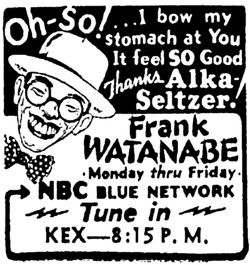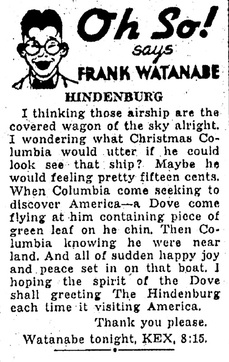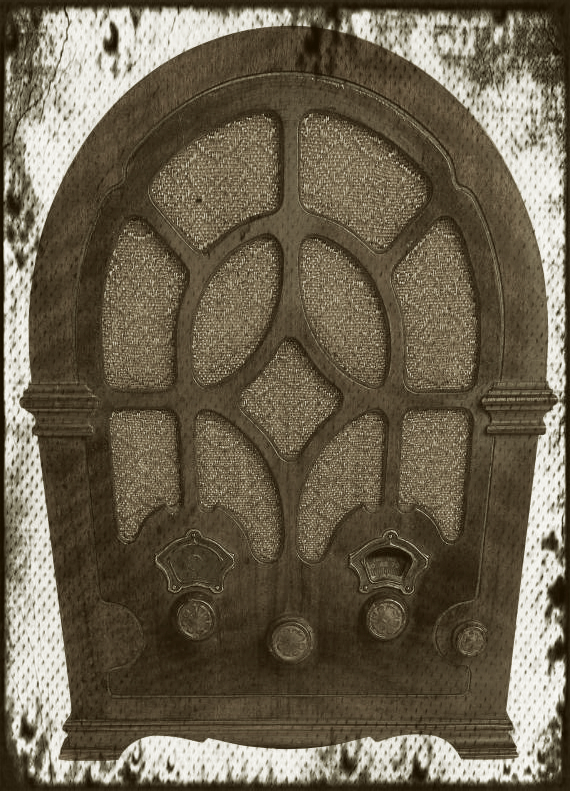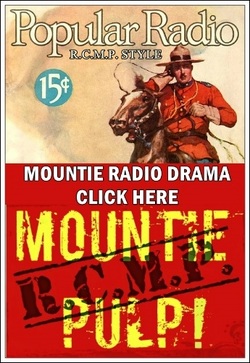
In those early days of radio, well before the profound effects of the civil rights movement, there was an interesting transition point for the media exposure of immigrants and minorities in American culture. The popular media of the time was peppered with ethnic stereotypes, and some were quite well known, even beloved. Most people, even now, are familiar with Amos & Andy, Charlie Chan, Mr. Moto, and even milder portrayals, such as Luigi Bosco in the well-known series Life With Luigi, and Mrs. Goldberg in the charming Jewish-oriented soap The Goldbergs. It was rare to have a non-white-identified person play their own race at that time, and if so, they were usually not allowed the full spectrum of human expression.
As much as people may be offended by these things now, back on the 1930's and 40's these characters were a regular part of the lives of most Americans. Warner Oland's Charlie Chan was popular, as well as was Peter Lorre's fantastic Mr. Moto, and along with Boris Karloff's Mr. Wong, they were always the smartest men in the room; the Caucasian characters (the good guys, anyway) always deferred to their skill. Of course this wasn't always the case (Amos & Andy is a less flattering example), and in any discussion of the subject the more negative aspects must be fully acknowledged. That said, I don't let those very real issues detract from the artistic contributions of the period. The aforementioned characters have provided some of my fondest watching and listening experiences, whether I'm expected to shun them or not.
As much as people may be offended by these things now, back on the 1930's and 40's these characters were a regular part of the lives of most Americans. Warner Oland's Charlie Chan was popular, as well as was Peter Lorre's fantastic Mr. Moto, and along with Boris Karloff's Mr. Wong, they were always the smartest men in the room; the Caucasian characters (the good guys, anyway) always deferred to their skill. Of course this wasn't always the case (Amos & Andy is a less flattering example), and in any discussion of the subject the more negative aspects must be fully acknowledged. That said, I don't let those very real issues detract from the artistic contributions of the period. The aforementioned characters have provided some of my fondest watching and listening experiences, whether I'm expected to shun them or not.

Now that the proper caveats have been made, I feel prepared to present the wonderfully amusing but socially eye-burning character Frank Watanabe. Frank is the valet (he's called a 'houseboy', but his duties are primarily that of a valet) of the well-to-do English fop Archie, amusingly played by the well-spoken film actor Reginald Sharland. Watanabe seems to enjoy his employer, and is always playing the raconteur, telling jokes and stories that the honourable Archie never seems to understand. There's a good reason for that. Frank was played by voice actor Eddie Holden, and when it came to stereotyped dialect, he really pulled out all the stops. The character is supposedly Japanese, from Tokyo, and the dialogue is so convoluted that at times it comes across as a racially intense tongue-twister. In spite of that, I find myself enjoying their antics; it's a sort of inverted Jeeves and Wooster, yet one isn't quite sure who is the genius and who is the twit. The comparison goes further in that they're always in some sort of sticky situation, and Archie always involves Frank in the solution. They're simple stories, usually only fifteen minutes in length, and at times verge on being standup routines. Still, Holden and Sharland keep the fun going in a light and peppy way, showing glimpses of the deeper talents hidden behind the shtick.
| During his career Eddie Holden used his skills in far less controversial ways than Frank Watanabe, doing the voices for a number of animated features, including the part of Squirrel in Disney's Bambi, and that of a clown in Dumbo. His other non-radio performances were primarily in b-reel features, including the suspense drama Torture Ship and the mega-fun cowboy picture The Fighting Deputy (featuring my favourite western coot, Al "Fuzzy" St. John). The inscription on the photo to the right is a fun reference to Frank Watanabe, and is written in the dizzy dialect of the character. Very cool. Reginald Sharland also had a short list of films to his name throughout the 1930's, but to me, as a fan of UK television, his claim to fame is that he's the father of Peter and David Croft. Peter Croft made his name as a TV director, working on shows such as Sexton Blake, The Black Arrow, and Lord Tramp. David Croft is especially interesting to me, as he penned the scripts of some of my top favourite programmes, including Dad's Army, Are You Being Served, It Ain't Half Hot Mum, Hi-de-hi, 'Allo 'Allo, Oh Doctor Beeching, and the delectably perfect You Rang, M'Lord |
From a historial point of view, the timeline of the show's run is telling. Frank Watanabe and the Honourable Archie ran up until 1939, and then, mysteriously (or perhaps not so), there was a failed spinoff in 1940, titled merely The Honourable Archie...without his Japanese Houseboy. One year later, the Japanese attacked Pearl Harbor, and the United States was in a full-on war with Japan. At that point, the idea of a sympathetic Japanese character on the American airwaves would have been surreal (yep, in spite of the stereotype, Frank Watanabe was very much so, especially relative to the propaganda that would follow); even Mr. Moto's film run ended in 1939, returning a distant twenty-six years later. In spite of it's eye-burning cultural aspects, I hope that you'll listen and enjoy the show. I'm pretty certain you'll have fun...just keep the eye drops handy.
Download the episode "Frank & Archie try to pass a cop in disguise" HERE
Download the episode "Frank & Archie try to pass a cop in disguise" HERE



 RSS Feed
RSS Feed


